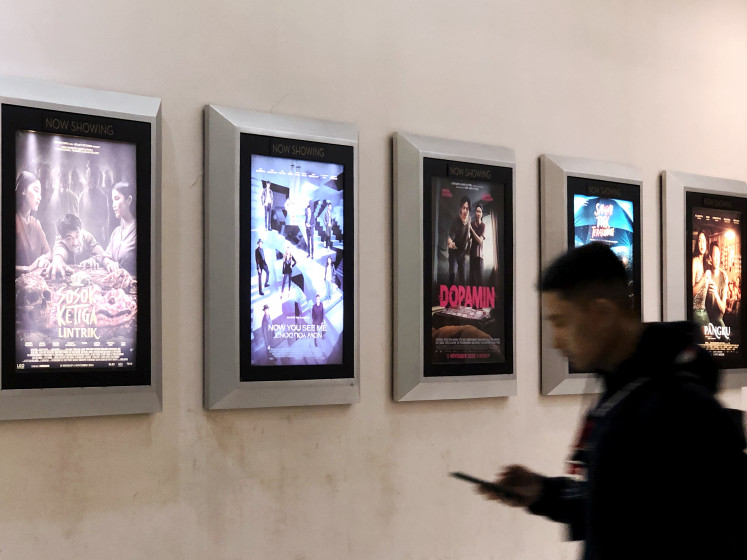Popular Reads
Top Results
Can't find what you're looking for?
View all search resultsPopular Reads
Top Results
Can't find what you're looking for?
View all search resultsThe roots of terrorism in Indonesia
Several scholars have expressed concerns over the rising of Puritanism and fundamentalism among young Muslims in Indonesia
Change text size
Gift Premium Articles
to Anyone
S
everal scholars have expressed concerns over the rising of Puritanism and fundamentalism among young Muslims in Indonesia. Some have even come to the conclusion that many young Muslims have received misinterpretations of Islam. The confession of captured terrorists is often shocking for mainstream Muslims, who believe the criminals' faith deviates from Islamic teachings.
So, how could these misinterpretations happen and why?
In the Indonesian context, the first possible answer is the presence of many young Muslims from clandestine, puritan and fundamentalist movements. Many also come from Wahabism, which is based on teachings that are mostly imported from the Middle East.
What this young generation fails to understand then is how Indonesia has its own localized Islam that for a long time ensured peace and prosperity within its multicultural society. But with the ideology of war they obtained from ceaseless conflicts in regions in the Middle East, these young people then established their own agendas, which often disrupt peace and harmony in society.
The other possible reason is the tendency of radicals to interpret sacred religious texts out of context. Many interpretations have been engineered just to justify their needs.
One of significant example is how the movement to establish khilafah, the assumed ideal form of statehood in Islam, is continuously endorsed although the term itself is never clearly stated in religious texts as a form of Islamic government or political body. The historical argument about past Islamic khilafah is the same, because after the era of the Four Great Prophet Muhammad Companions, Muslims were divided into kingdom-like states. One example is the Kingdom of Saudi Arabia.
Besides, the period of the Harun Al-Rasyid kingship, which was famous for its justice and prosperity and was often cited by proponents of the khilafah movement, was actually based more on multiculturalism and freedom where followers of other religions coexisted in peace. We could see this in the progress of scientific achievements at the time, which were not only developed by Muslims, but also non-Muslim scientists.
The other misinterpreted concept is of course about jihad, a word which literally means a total effort to achieve something. This word has been interpreted inappropriately more as a sacred act for the call of offensive struggle against non-Muslims in hope of achieving eternal life beside God.
While at a glance some verses of the Koran could be referred to this meaning, in the context of involving oneself in a war, the more contextual and more acceptable meaning of the verses is actually to totally defend Muslims from the offenses of others and to make every effort to build and maintain a peaceful society.
And this more contextual and acceptable meaning could be seen in the historical wars undertaken by the Prophet Mohammed himself, all of which were for defense. Even the last war, which was historically called Fath al-Makkah, the Conquest of Mecca, was an offensive to defend Muslims in Medina and to secure their daily activities such as from night raids and other crimes of the Meccan people and surrounding tribes.
Based on these misinterpreted examples, there should be a movement endorsed and set up by Islamic experts to continuously contextualize the interpretations of religious texts. There must be an effort to build awareness that textual approaches are only a small part of many ways, and to avoid using narrow-mindedness to understand Islam.
In accordance with these efforts, the more proper way to understand Islam is through looking at values practiced by Muslims in the early days of Islam -values which have been widely discussed by the late Islamic expert Nurcholish Madjid in an environment called masyarakat madani (civil society) - to represent the Medina society built by the Prophet Mohammed. Many orientalists or Islamic scientists, such as John L. Esposito and Ira Lapidus, have confirmed that this society had wonderful values of peace and anti violence.
Therefore, there should also be an effort to avoid practicing Islamic teachings based on symbols alone, as is often demonstrated by celebrity preachers and middle-class Muslims in Indonesia. What we need to learn and practice is religiosity, as the essence of religion. There must be love instead of hatred, empathy instead of animosity and harmony instead of war.
Politicians need to make efforts to end attempts to politicize Islam. Let us stop pretending we want to represent and defend Islam, when in actual fact we are struggling for our own purposes.
Since Islamic clerics have the utmost responsibility in the proper interpretation of Islamic teachings, along with their concerns for a peaceful Indonesia and nonviolent Islam, they need to encourage Muslim preachers, especially during Friday prayers, to promote peace and love for others and not hatred and violence.
Society needs to do the same thing. It must be aware that any religious teachings or services that contain violence-oriented values or notions should be avoided and left as soon as possible because they are actually dissenting from Islamic teachings.
Hopefully, with these efforts, Indonesia will remain safe and peaceful. Let us make terrorism a matter of the past, where we can see Indonesian football teams playing against any world-class teams without any fears of terrorism coming up. The cancellation of Manchester United's tour after the July 17 bombings in Jakarta should be the last.
The writer is the international programs officer at Lazuardi Global Islamic School, Jakarta.










